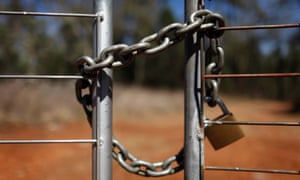Activists and farmers hail decision after inquiry into onshore unconventional gas received 1,600 submissions

Victoria is to introduce a permanent ban on all onshore unconventional gas exploration, including fracking and coal seam gas, becoming the first Australian state to do so.
The premier, Daniel Andrews, made the announcement on Tuesday morning and said legislation for the ban would be introduced later this year, making the current moratorium on unconventional gas exploration permanent.
A parliamentary inquiry last year into onshore unconventional gas in Victoria received more than 1,600 submissions, most of them opposed to fracking and coal seam gas exploration.
A statement from the Department of Premier and Cabinet said: “It is clear that the Victorian community has spoken. They simply don’t support fracking.
“The government’s decision is based on the best available evidence and acknowledges that the risks involved outweigh any potential benefits to Victoria.”
The government said the move would protect the reputation of Victoria’s agriculture sector, which employs more than 190,000 people; provide certainty to regional communities; and end anxiety felt by farmers about the environmental and health risks associated with fracking.
Exemptions to the ban will remain for activities not covered by the current moratorium, such as gas storage, carbon storage research and accessing offshore resources. Exploration and development for offshore gas will also continue.
The Greens energy spokeswoman, Ellen Sandell, welcomed the news, describing it as “a relief to communities that have fought the threat of fracking for years”.
“This decision proves the power of grassroots advocacy,” she said. “Individuals have won over powerful and influential mining companies, and the Greens are proud to have led the political campaign which forced the government to support a permanent ban.
“But it’s disappointing the government is leaving the door open to conventional gas drilling after the next state election. We won’t stop fighting until all onshore gas drilling is banned.”
A dairy farmer in the Victorian coastal town of Seaspray, Julie Boulton, said the threat of unconventional gas mining had been hanging over farmers’ heads for years. “It has been so heart-wrenching at times, when we thought the drill rigs were coming and there was nothing we could do,” she said.
“But we pulled together as a community and decided to fight this threat to our farmland, water and health and today’s decision is just fantastic – we are ecstatic.”
Over the past five years the Lock the Gate coalition of rural communities, environmental groups and farmers has fought unconventional gas exploration.
Chloe Aldenhoven, coordinator for Lock the Gate, said about 1.4m hectares of Victoria was threatened by some form of onshore gas mining, which included coal seam gas, tight gas, shale gas and underground coal gasification. “Labor has shown real leadership by listening to community concerns,” she said.
“This is good news for every Victorian, but for the farming communities that have been fighting to stop this industry for over five years now, this is a wonderful day. This decision gives them certainty to move forward, and this decision protects Victoria’s vital clean and green image.”
Principal Adviser at The Australia Institute, Mark Ogge, praised the ban as “sound economic and energy policy”.
He said that Queensland’s experiment in unconventional gas had demonstrated that the economic benefits promised by the gas industry had largely failed to materialise, while negatively impacting other industries. Research had found that for every 10 new gas jobs, 18 agricultural jobs were lost, he said.
“The manufacturing industry has been one of the biggest losers with LNG exports allowing gas suppliers to drive up prices to Australian users, and suppliers exercising their market power keep Australian prices high even as global prices collapsed,” Ogge said.
“We now have the ridiculous situation that Australian gas is now cheaper in Korea than it is in Australia. That’s a double-disaster for local manufacturing jobs.
“What benefits there are, have gone almost entirely to the overseas owners of global oil and gas companies licensed to export Australian gas, largely at the expense of Australian businesses and local jobs.”

